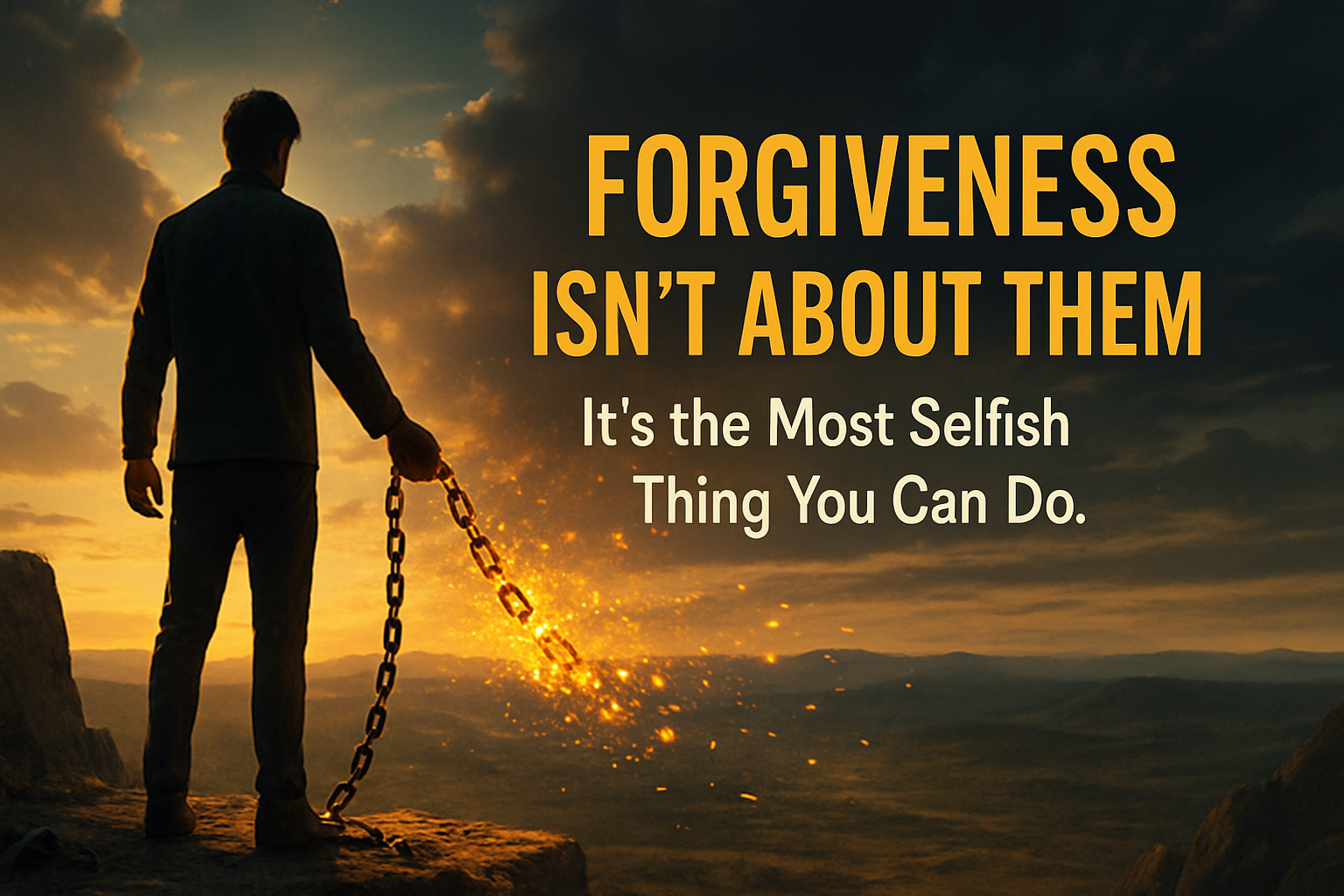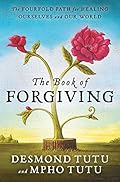
Forgiveness Isn't About Them. It's the Most Selfish Thing You Can Do.
By Derek Neighbors on November 10, 2025
Someone joined a company I was an executive at, made a complete mess, and threw all the blame on me.
I spent the better part of two years seething. Bitter. Angry. Full of self-doubt. Every shower became a theater for rehearsing conversations that would never happen, letting the anger ooze off in imaginary confrontations where I’d finally say everything I should have said. Three years of mental energy spent on someone who wasn’t thinking about me at all. I needed to practice the discipline of elimination on my own resentment. Three years in a prison of my own making while they walked free, building their career, completely unburdened by what happened between us.
The moment I realized this, something shifted. I wasn’t holding them accountable. I was giving them free rent in my head. Every minute I spent hating them was a minute I wasn’t using to build what came next.
That’s when I understood what the Stoics knew two thousand years ago: forgiveness isn’t noble sacrifice for the other person. It’s the most selfish thing you can do.
The Eternal Question
Why do we hold onto resentment when it clearly hurts us more than the person who wronged us?
It’s one of humanity’s oldest patterns. Someone betrays you, abandons you, wrongs you in a way that cuts deep. The injury happens once. But then you carry it. You rehearse it. You build identity around it. Years later, they’ve forgotten. You’re still processing.
The Greeks wrestled with this. The Stoics built entire philosophical frameworks around it. Two millennia later, we’re still stuck in the same trap, just with better branding. We call it “never forget” and wear it like a badge of honor. We confuse holding grudges with holding standards. We mistake resentment for self-respect.
The timeless human dilemma: the struggle between justice and peace, between the ego’s demand for revenge and the soul’s need for freedom.
What the Ancients Knew
Marcus Aurelius, writing to himself late at night in a military tent, understood something most people never figure out: “The best revenge is to not be like that.”
Not to become the person who wronged you. Not to let their actions corrupt your character. Not to give them ongoing power over who you’re becoming.
Seneca went further. He wrote that anger is like drinking poison and expecting the other person to die. The resentment you’re carrying doesn’t hurt them. It corrodes you from the inside while they move freely through their life.
Epictetus, who’d been a slave and knew what it meant to have no external power, taught the control dichotomy. We cannot control others’ actions. We can only control our responses. Every moment spent resenting what we cannot control is a moment spent in voluntary imprisonment.
The Stoics weren’t preaching forgiveness as moral virtue signaling. They were teaching it as strategic self-interest. Holding grudges gives others ongoing power over your internal state. Forgiveness is how you reclaim that power.
They understood that resentment isn’t strength. It’s choosing to let someone live rent-free in your head, consuming energy you could redirect toward building what matters.
This isn’t wisdom reserved for those with advantages. The immigrant working three jobs to feed their family faces the same prison of resentment as the Fortune 500 CEO. The single parent scraping by faces the same choice as someone with generational wealth. The circumstances are opposite. The internal prison is the same. This is reality for anyone with a mind capable of choosing its thoughts.
How We Lost This Wisdom
Somewhere between ancient philosophy and modern psychology, we started confusing forgiveness with condoning bad behavior.
We made resentment part of identity. “I’m the person this happened to.” The wound becomes the brand. Your hurt becomes your story. On social media, that story gets likes, shares, validation. The modern economy of grievance rewards staying wounded.
We confused boundaries with grudges. Setting a boundary is strategic. It protects you going forward. A grudge is carrying the past injury into every present moment, letting it steal energy that could build your future.
We weaponized victimhood as social currency. The person with the most documented injuries wins. “Never forget” culture keeps us locked in past hurts, rehearsing them, maintaining them, unable to move forward because the wound has become our identity.
We confuse using past injury as fuel with carrying ongoing resentment. The first is taking what happened and converting it to energy for building what comes next. The second is letting what happened consume your energy while you replay it endlessly. One transforms the past into forward motion. The other is being consumed by it while standing still.
The biggest lie we tell ourselves: holding anger is holding power.
Actually, it’s the opposite. Resentment is giving someone who hurt you continued access to your energy, your focus, your capacity for excellence. They move on. You stay stuck. They wronged you once. Now you’re wronging yourself repeatedly by continuing to give them space in your head.
The Radical Reframe
Here’s what most people miss about forgiveness: it’s not noble sacrifice for the other person. It’s radical selfishness.
You’re not releasing them from accountability. You’re releasing them from your energy. You’re reclaiming the real estate in your mind they’ve been occupying without paying rent. You’re deciding to stop giving someone who wronged you ongoing power over your peace.
What forgiveness actually is:
- Deciding to stop letting past injury steal your future capacity
- Refusing to let someone continue taking your energy years after they stopped thinking about you
- Choosing to redirect energy from resentment toward building what comes next
- Setting them down so you can pick up something more useful
What forgiveness is not:
- Saying what they did was okay
- Letting them back into your life
- Forgetting what happened or pretending it didn’t hurt
- Removing consequences for their actions
- Trusting them again
This is the distinction most people never make: you can forgive someone and never speak to them again. You can forgive and maintain boundaries. You can forgive and still hold them accountable. You can remember what happened without letting it occupy ongoing energy.
Moving on is strategic detachment, you cut them out and focus elsewhere. Forgiveness is releasing them from the debt they owe you. Not because they deserve release. Not because what they did was okay. But because collecting that debt costs you more than it’s worth. You’re not saying they don’t owe you. You’re saying you’re done trying to collect.
Forgiveness is about your freedom, not their redemption.
The Practice
The Stoics weren’t interested in abstract philosophy. They wanted practical wisdom you could actually use. Here’s how to practice this:
Do the energy audit. For one week, every time you think about the person or situation with anger, make a note. Track it. You’ll be horrified at how much mental energy you’re giving to something that already happened, that you cannot change, involving someone who isn’t thinking about you.
That’s energy not going toward your goals, your relationships, your craft, your future. Every broken promise you make to yourself about “letting it go” compounds the damage. Every minute spent in resentment is a minute stolen from building what comes next.
Ask the rent-free question. Right now, is the person who wronged you thinking about you? Probably not. So why are you giving them free space in your mind? Why are they occupying real estate in your head without paying rent?
The answer usually involves ego. Letting go feels like they “win.” But they already moved on. You’re the only one still playing the game. The only person you’re punishing is yourself.
Make the selfish choice. This is phronesis, practical wisdom. Look at what actually serves you. Does carrying this wound forward make you better, stronger, more capable? Or does it just make you occupied?
Forgiveness requires courage not because it goes against self-interest, but because it goes against the ego’s definition of self-interest. The ego wants vindication. It wants proof you were right and evidence they were wrong. It wants everyone to know what they did to you. Actual self-interest wants freedom to build what comes next. The ego chooses feeling right over being free.
Forgiveness isn’t moral posturing. It’s strategic self-interest. You’re done paying rent on old wounds. You’re reclaiming that energy and redirecting it toward something that actually builds what you want.
Maintain boundaries without resentment. Here’s where people get confused. Forgiveness doesn’t mean “come back in.” You can forgive someone and still never let them near you again. The boundary exists because it serves you, not to punish them.
You can hold boundaries with peace instead of anger. The boundary is strategic protection. The anger is optional weight you’re choosing to carry.
The Character Formation
This practice is how you develop sophrosyne, self-control. Not control over them, control over your response. Mastering your internal state regardless of what others do.
This is andreia, courage. It takes more courage to let go of the wound than to keep carrying it. The ego wants to hold on. Releasing it means facing the uncomfortable truth that continuing to resent them hurts only you.
This is arete, excellence. Refusing to let others diminish your capacity. Choosing to be excellent even when others weren’t excellent to you. Because excellence is rented, not owned, and resentment defaults on that payment. Not because they deserve it, but because you refuse to let their actions corrupt your character.
Aristotle called human flourishing eudaimonia, actualizing your rational capacity, becoming what you’re capable of becoming. Resentment is the opposite of flourishing. It’s giving your rational capacity over to rehearsing what you cannot change, to replaying what already happened, to arguing with people who aren’t in the room. Every moment spent there is a moment not actualizing what you could become. You’re not flourishing. You’re withering while replaying the past.
The transformation happens when you shift from “what they did to me” to “what I’m building next.” From victim imprisoned by the past to architect of the future. The person who hurt you becomes irrelevant, not because you’re pretending it didn’t happen, but because you’ve reclaimed the energy they were stealing.
Final Thoughts
Look at the resentments you’re carrying right now. Ask yourself honestly: who is this hurting more?
Are you punishing them or imprisoning yourself?
Every day you spend hating someone is a day you’re not using that energy to build your life. They’re fine. They’ve moved on. You’re the only one still in chains.
What would you do with all that energy if you redirected it toward something that actually serves you?
That’s not forgiveness as moral high ground. That’s forgiveness as radical selfishness. And it might be the smartest thing you ever do.
The wound happened. That’s not in your control. But whether you keep feeding it, rehearsing it, maintaining it, letting it steal your capacity for excellence, that’s entirely your choice.
The Stoics knew: the best revenge isn’t making them pay. It’s refusing to let what they did diminish who you’re becoming.
Ready to stop letting past wounds steal your future capacity? MasteryLab provides the framework and community for people who are done giving others free rent in their heads. Time to reclaim that energy and build something worth your attention.




